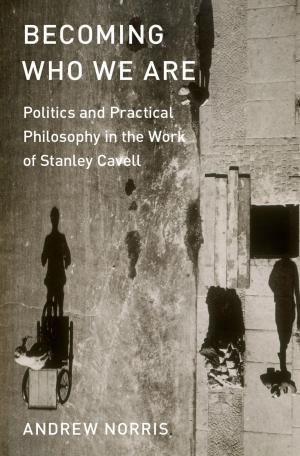NEW BOOK FROM PROFESSOR ANDREW NORRIS: Becoming Who We Are
Professor Andrew Norris’s new book has just been released from Oxford University Press. It is entitled Becoming Who We Are: Politics and Practical Philosophy in the Work of Stanley Cavell. We asked Professor Norris to talk about the book.
Tell us a little about yourself and what those interested in your work should know about you.
Professor Norris: I studied Philosophy at UC Santa Cruz and got a Ph.D. in an interdisciplinary Rhetoric department at UC Berkeley. In addition to this book, I have edited three books and written more than 30 (peer-reviewed) articles about authors such as Hegel, Oakeshott, and Arendt.
I have been fortunate enough to receive a number of nice fellowships, mostly from Germany. Here at UCSB, I am an affiliated faculty member of the departments of Philosophy and of Religious Studies, and I am on the steering committee for a very exciting new project, the International Center for the Humanities and Social Change.
What motivated you to explore this topic? Why this, why now?
Professor Norris: I first read Cavell as an undergraduate. I was a huge fan of the great 20th century philosopher of language, Ludwig Wittgenstein, and Cavell was the only person whom I read who seemed to see the depth and mystery that I saw in Wittgenstein.
Although Cavell plays a very important role in Hanna Pitkin’s book, Wittgenstein and Justice, which I also read at the time, I was not initially interested in what Cavell might have to say about politics, but rather about language, the self, and the moral life. Over time, though, I came to see that he has something important to say about politics as well, and after editing a book of essays on this topic for Stanford in 2006, I began working on this book.
Who should read this book?
Professor Norris: I’m not sure anyone “should” read this book, and I think anyone who hopes that philosophy might be usefully “applied” is probably due for a disappointment. But I think the book has some helpful things to say not only about Cavell’s work, which is sometimes very difficult to understand, but also about our common life. In particular, it gives what I hope is a helpful account of Cavell’s thinking about democratic politics.
Cavell argues that in democratic political life citizens are called upon not just to pursue their own individual interests, but to give voice to values and identity they hold in common—to speak for one another as members of the community. Such speech is meant to be provocative in the sense of eliciting a response from their fellow citizens as to whether they’ve got it right. On this account, politics is fundamentally deliberative and exploratory. Cavell sees such politics as a moment in our pursuit of autonomy.
Autonomy is sometimes understood in the Kantian tradition as a mode of self-legislation in which a “higher” rational self that is free from the determinism of the physical world gives law to a “lower” self of limited and partial urges and needs and desires.
Cavell thinks that the idea of sheer self-activity is a fantasy: he doesn’t just think that it is unreal, but that it is an idea that would only come to a particular kind of being, one who is stuck, unable to move forward and act and speak in a manner that is free and expressive of her own desires and talents. Freedom is found in the passage out of my current stuck state into a more expressive, open way of being—that of a higher self, or better me.
And, again, our relation to one another is crucial. Because it is the other who shows me a way forward, by showing me, first, that I am stuck, and, second, how to move out of that condition. This happens first and foremost in those moments where another (citizen) speaks for me by speaking for us. That she does this, rather than I, shows me to be mute, voiceless; but it also shows me how to speak, for myself, for her, for us. She attracts me to my own better self. On this account, autonomy and self-expression emerge of necessity from failure and what Emerson calls conformity. In dark times like ours, when one is sometimes tempted to give up hope in autonomous, democratic politics, I find this a heartening thought.
What is next for you? What are you working on now?
Professor Norris: I am always writing essays, and I am finishing two now, one on neoliberalism and political realism, and one on skeptical politics since Parmenides. I have also been working on self-realization in pragmatism, and I want to pursue that further. Finally, I am in the early stages of a large project on the idea of the primacy of the practical, a view that is associated with Fichte, Marx, Dewey, and Wittgenstein, among others.





